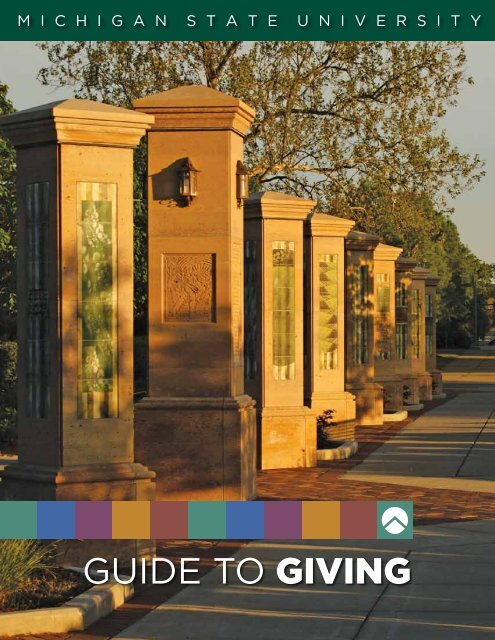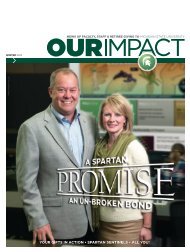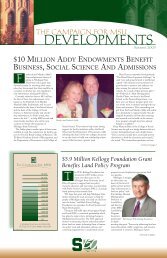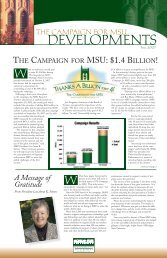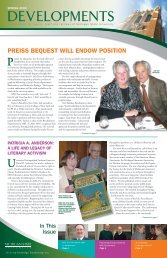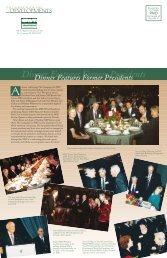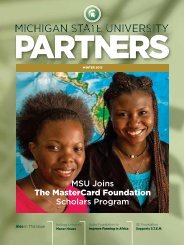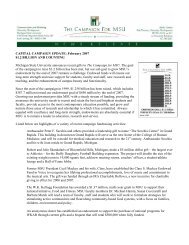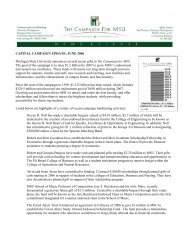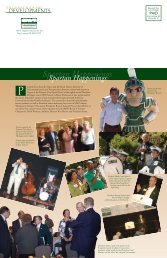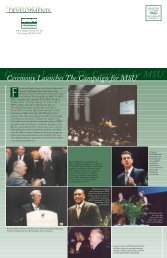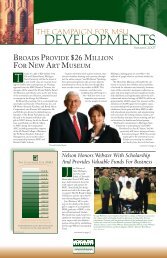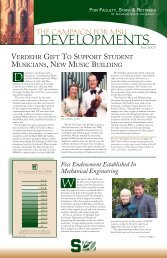Guide To GivinG - Giving to MSU - Michigan State University
Guide To GivinG - Giving to MSU - Michigan State University
Guide To GivinG - Giving to MSU - Michigan State University
You also want an ePaper? Increase the reach of your titles
YUMPU automatically turns print PDFs into web optimized ePapers that Google loves.
M i c h i G a n S t a t e U n i v e r s i t y<br />
<strong>Guide</strong> <strong>To</strong> <strong>Giving</strong>
For more information, contact:<br />
<strong>University</strong> Development and<br />
THE OFFICE OF GIFT PLANNING<br />
<strong>Michigan</strong> <strong>State</strong> <strong>University</strong><br />
300 Spartan Way<br />
East Lansing, <strong>Michigan</strong> 48824-1005<br />
(517) 884-1000 or (800) 232-4678<br />
Fax (517) 432-1129<br />
www.msu.planyourlegacy.org<br />
www.giving<strong>to</strong>.msu.edu
M i c h i g a n S t a t e U n i v e r s i t y<br />
<strong>Guide</strong> <strong>To</strong> <strong>Giving</strong><br />
Great universities, like <strong>Michigan</strong> <strong>State</strong> <strong>University</strong>,<br />
thrive on challenge and imagination and grow on<br />
initiative and success. Each year, thousands of alumni<br />
and friends support <strong>Michigan</strong> <strong>State</strong> <strong>University</strong> by<br />
contributing their time, talents and money <strong>to</strong> a<br />
myriad of university academic, athletic and cultural<br />
programs. Indeed, private philanthropy represents<br />
a critical resource that enables <strong>MSU</strong>’s outstanding<br />
faculty and student body <strong>to</strong> excel at teaching and<br />
learning, research in the humanities and sciences,<br />
and technological development. It is our hope that<br />
you will continue this tradition by remembering<br />
<strong>Michigan</strong> <strong>State</strong> <strong>University</strong> through current gifts and<br />
commitments through your estate plans that fulfill<br />
your philanthropic wishes.
CURRENT GIFTS<br />
AND PLEDGES<br />
This section of the booklet provides information on making current contributions <strong>to</strong> <strong>MSU</strong>.<br />
Current gifts can be cash contributions that you give now and from which <strong>MSU</strong> benefits<br />
immediately. They may involve pledges payable over a five-year period but are not<br />
considered gifts from your estate. Current gifts, often made in concert with and in support<br />
of charitable estate planning strategies, can have a significant and immediate impact on<br />
<strong>MSU</strong> in general or the college or academic, athletic or cultural program of your choice.<br />
Included in this section of the <strong>Guide</strong> <strong>to</strong> <strong>Giving</strong> is information on where <strong>to</strong> send gifts and the<br />
types of gifts considered current, such as cash, securities, gifts of personal and real property,<br />
bargain sales and gifts of closely held s<strong>to</strong>ck.<br />
4
giving<strong>to</strong>.msu.edu<br />
GIFTS OF CASH<br />
Gifts of cash consist of any immediate transfer of funds<br />
from you <strong>to</strong> <strong>Michigan</strong> <strong>State</strong> <strong>University</strong>. This can be<br />
accomplished through mailing a personal check made<br />
payable <strong>to</strong> <strong>Michigan</strong> <strong>State</strong> <strong>University</strong>. Credit card gifts are<br />
also considered cash. You may call with your credit card<br />
number, amount of gift and desired designation, and<br />
the amount will be charged <strong>to</strong> your Discover, American<br />
Express, Visa or MasterCard. Our telephone numbers<br />
are 517-884-1000 or 1-800-232-4678. The <strong>University</strong><br />
Development website, located at www.giving<strong>to</strong>.msu.edu,<br />
also offers a safe and easy way <strong>to</strong> make a cash gift with<br />
your credit card. Simply access the site and follow the<br />
instructions and your gift will be processed immediately<br />
with the latest security in Internet technology.<br />
GIFTS OF SECURITIES<br />
Gifts of securities can be made easily when your broker<br />
transfers shares electronically <strong>to</strong> <strong>MSU</strong>. <strong>Michigan</strong> <strong>State</strong><br />
<strong>University</strong> has accounts established with multiple<br />
brokerage firms. Please contact <strong>University</strong> Development<br />
at 517-884-1024 or 517-884-1000 <strong>to</strong> obtain the necessary<br />
information <strong>to</strong> complete a s<strong>to</strong>ck gift, be it an electronic<br />
(wire) transfer or a gift of an actual certificate(s).<br />
Over the years, you may have accumulated s<strong>to</strong>ck that has<br />
appreciated in value. You have a concern about selling<br />
the s<strong>to</strong>ck, since there may be as much as a 15% capital<br />
gains tax due on the difference between your original<br />
cost basis and the fair market value of the s<strong>to</strong>ck at the<br />
time you sell it. Here’s a thought: if you are interested in<br />
supporting <strong>Michigan</strong> <strong>State</strong> <strong>University</strong>, consider donating<br />
some of your appreciated s<strong>to</strong>ck <strong>to</strong> <strong>MSU</strong>. That way, you<br />
can make a significant gift plus avoid the capital gains<br />
tax.<br />
Current tax laws provide an incentive for you <strong>to</strong> make a<br />
charitable gift of s<strong>to</strong>ck at a remarkably low tax cost. The<br />
tax savings are achieved in two ways. First of all, you pay<br />
no capital gains tax when you transfer (gift) appreciated<br />
s<strong>to</strong>ck <strong>to</strong> <strong>Michigan</strong> <strong>State</strong> <strong>University</strong>. Secondly, you may<br />
take a charitable income tax deduction for the full fair<br />
market value of the s<strong>to</strong>ck on the date of transferring<br />
(gifting) the s<strong>to</strong>ck <strong>to</strong> <strong>Michigan</strong> <strong>State</strong> <strong>University</strong>. You may<br />
utilize your gift of s<strong>to</strong>ck charitable deduction up <strong>to</strong> 30%<br />
of your adjusted gross income.<br />
The s<strong>to</strong>ck value is determined by the average between<br />
the high and low trade values on the date the s<strong>to</strong>ck<br />
enters <strong>MSU</strong>’s account. Whether making a s<strong>to</strong>ck transfer<br />
electronically or by any other means, you are requested<br />
<strong>to</strong> submit a letter <strong>to</strong> <strong>University</strong> Development, Attn:<br />
Gift and Member Services, explaining your intent <strong>to</strong><br />
transfer (gift) the s<strong>to</strong>ck. The letter, which can be mailed<br />
or faxed <strong>to</strong> <strong>MSU</strong>’s <strong>University</strong> Development office<br />
(contact information is available on the back cover),<br />
should contain the name of the s<strong>to</strong>ck, the number of<br />
shares, the gift designation, your name address, and<br />
broker reference information. Gifts of securities may be<br />
accepted but not negotiated by <strong>MSU</strong> without a signed<br />
letter of instruction/intent from the donor(s).<br />
GIFTS OF TANGIBLE PERSONAL PROPERTY<br />
A gift of tangible personal property, such as a work or<br />
collection of art, rare books, stamp or coin collection,<br />
etcetera, entitles you <strong>to</strong> a charitable deduction based on<br />
the full fair market (appraised) value of the gift, if the gift<br />
complies with the standard of “related use” regarding the<br />
designation at and use by <strong>Michigan</strong> <strong>State</strong> <strong>University</strong>.<br />
For example, a painting may be donated <strong>to</strong> the Eli &<br />
Edythe Broad Art Museum or rare books <strong>to</strong> the <strong>MSU</strong><br />
Libraries for the exempt purposes of the university. A<br />
contribution of tangible personal property that will be<br />
used by <strong>MSU</strong> entitles you <strong>to</strong> a charitable deduction for<br />
the full fair market value of the personal property given,<br />
if documented by a legitimate appraisal originated, but<br />
not prepared, by the donor(s) or <strong>MSU</strong>. The “related use”<br />
charitable deduction is limited <strong>to</strong> 30% of your adjusted<br />
5
current gifts and Pledges<br />
gross income (AGI) and may be carried forward, if<br />
necessary, for five consecutive tax years until completely<br />
utilized. Property accepted and received by <strong>MSU</strong> but<br />
“unrelated” <strong>to</strong> the exempt purposes of <strong>MSU</strong>, then sold<br />
<strong>to</strong> create your gift, entitles you <strong>to</strong> a charitable deduction<br />
for your cost basis in the property, subject <strong>to</strong> a 50% AGI<br />
ceiling. Here again, and if necessary, a five-year carryover<br />
period is available <strong>to</strong> take full advantage of the allowable<br />
charitable deduction. Contact the gift planning<br />
professionals within the <strong>MSU</strong> Office of Gift Planning for<br />
an explanation of the charitable deductions subject <strong>to</strong><br />
the 30% and 50% Adjusted Gross Income Limitation Rule<br />
applicable <strong>to</strong> your gift and income scenario.<br />
FEATURES & BENEFITS<br />
• Opportunity <strong>to</strong> make a unique and substantial<br />
gift <strong>to</strong> <strong>MSU</strong><br />
• Realize an immediate charitable tax deduction<br />
• Estate tax and probate savings<br />
• Avoidance of capital gains tax<br />
• If retained by <strong>MSU</strong> for “related” use, peace of<br />
mind knowing your personal property will be<br />
appreciated, maintained and efficiently utilized<br />
by <strong>Michigan</strong> <strong>State</strong> <strong>University</strong><br />
BARGAIN SALES<br />
A bargain sale is a mutually agreed upon sale of property<br />
<strong>to</strong> <strong>MSU</strong> or the <strong>MSU</strong> Foundation for less than its fair<br />
market value (perhaps your original cost basis). It is<br />
an ideal arrangement for someone who would like <strong>to</strong><br />
receive a lump-sum cash payment and also make a<br />
current gift of property <strong>to</strong> <strong>MSU</strong>. You can recover your<br />
original investment and receive a charitable deduction<br />
for the contributed portion (the difference between the<br />
bargain sale price and the current appraised value of<br />
the property). However, tax law specifically states that a<br />
portion of the cash recovered may be treated as a capital<br />
gain. Therefore, some capital gains tax may be due.<br />
Please consult your legal counsel, tax advisor and/or the<br />
<strong>MSU</strong> Office of Gift Planning when considering a bargain<br />
sale gift. The professionals in the <strong>MSU</strong> Office of Gift<br />
Planning can prepare preliminary calculations, providing<br />
you a close estimate of your charitable deduction and<br />
capital gains tax liability.<br />
The charitable bargain sale works like this:<br />
1. <strong>MSU</strong> or <strong>MSU</strong> Foundation (<strong>MSU</strong>F) agree with<br />
donor(s) <strong>to</strong> purchase (receive) the property.<br />
<strong>MSU</strong> or <strong>MSU</strong>F agree with donor(s) on a<br />
purchase price that is less than the property’s<br />
appraised value; an appraisal acquired and<br />
paid by the donor(s)/sellers.<br />
2. <strong>MSU</strong> or <strong>MSU</strong> Foundation may pay the<br />
purchase amount upfront, or perhaps issue<br />
an installment note reflecting a mutually<br />
agreed upon purchase price, term of years and<br />
interest rate.<br />
The bargain sale is the only charitable gift plan that can<br />
give you a current lump sum of cash and a charitable<br />
deduction. In addition, you avoid capital gains tax on<br />
the portion of the transaction that represents the gift <strong>to</strong><br />
<strong>MSU</strong>.<br />
Here are two things <strong>to</strong> consider if you are contemplating<br />
a bargain sale <strong>to</strong>/with <strong>MSU</strong>.<br />
1. As with all gifts of real estate, the <strong>MSU</strong><br />
Office of Land Management must review<br />
and approve the purchase of property.<br />
6<br />
2. Donors/sellers will need <strong>to</strong> secure, no earlier than<br />
60 days prior <strong>to</strong> entering the bargain sale agreement
giving<strong>to</strong>.msu.edu<br />
with <strong>MSU</strong> or <strong>MSU</strong> Foundation, an independent appraisal<br />
of the property <strong>to</strong> establish its value for the bargain sale<br />
and subsequent charitable deduction calculation.<br />
The professionals within the <strong>MSU</strong> Office of Gift Planning<br />
can advise and assist you on these matters, procedures<br />
and charitable deduction calculation. Contact<br />
information is available on the back cover.<br />
Note: If you gift <strong>MSU</strong> or <strong>MSU</strong>F (and <strong>MSU</strong>/<strong>MSU</strong>F accepts)<br />
property carrying debt—a mortgage or a lien —and <strong>MSU</strong>/<br />
<strong>MSU</strong>F assumes and satisfies the debt, the IRS considers<br />
your donation <strong>to</strong> have been a bargain sale, even if we don’t<br />
pay you any cash. The amount of debt we assume will be<br />
considered taxable income <strong>to</strong> you.<br />
FEATURES & BENEFITS<br />
• Possible recovery of original investment in<br />
property<br />
• Opportunity <strong>to</strong> make a substantial current gift<br />
<strong>to</strong> <strong>MSU</strong><br />
• Realize an immediate charitable tax deduction<br />
(subject <strong>to</strong> 30% of AGI limitation rule)<br />
• Possible estate tax and probate savings<br />
• Reduction in capital gains tax<br />
• Ability <strong>to</strong> receive upfront cash from the bargain<br />
sale for personal use, relocation and/or new<br />
purchase<br />
GIFTS OF CLOSELY HELD STOCK<br />
A UNIQUE GIFT OPPORTUNITY FOR THE SPARTAN ENTREPRENEUR<br />
Individuals who own closely held s<strong>to</strong>ck may take<br />
advantage of unique gift opportunities. Business owners<br />
frequently hold s<strong>to</strong>ck with a low cost basis that has<br />
significantly appreciated as the business has grown and<br />
prospered. However, that s<strong>to</strong>ck typically has not paid a<br />
dividend. The owner, who usually controls the business,<br />
might want <strong>to</strong> distribute retained earnings from the<br />
business for personal use. Doing so causes the owner<br />
<strong>to</strong> be treated as though he or she received a dividend,<br />
resulting in a second tax on money already taxed at the<br />
corporate level.<br />
Ideally, the owner has two goals: <strong>to</strong> avoid the second tax<br />
and <strong>to</strong> unlock some of the corporation’s assets. Through<br />
a gift <strong>to</strong> <strong>Michigan</strong> <strong>State</strong> <strong>University</strong> (or the <strong>Michigan</strong> <strong>State</strong><br />
<strong>University</strong> Foundation) of shares in the corporation, it<br />
is possible <strong>to</strong> accomplish these goals, and provide a<br />
meaningful gift <strong>to</strong> <strong>MSU</strong>.<br />
The benefits of a gift of closely held s<strong>to</strong>ck are not unlike<br />
those of appreciated, publicly traded securities. The<br />
donor saves taxes twice: first with a personal income<br />
tax charitable deduction for the fair market value of<br />
the s<strong>to</strong>ck, and also by avoiding capital gains tax on the<br />
appreciation.<br />
The additional benefit of this gift arrangement may be<br />
realized through the subsequent sale of the corporation’s<br />
shares by <strong>MSU</strong> or <strong>MSU</strong> Foundation back <strong>to</strong> the<br />
corporation. The corporation’s redemption of the s<strong>to</strong>ck<br />
reduces accumulated earnings and the accompanying<br />
tax liability, and the s<strong>to</strong>ck is removed from the donor’s<br />
taxable estate. However, neither a sale nor redemption of<br />
the s<strong>to</strong>ck can be prearranged prior <strong>to</strong> making the gift <strong>to</strong><br />
<strong>MSU</strong>/<strong>MSU</strong>F.<br />
Finally, the donor has the satisfaction of knowing that<br />
he or she has made a significant gift that will be used <strong>to</strong><br />
meet the university’s highest priority needs, or support<br />
the college or academic/athletic/cultural program at<br />
<strong>MSU</strong> of interest <strong>to</strong> the individual donor(s). As long as<br />
<strong>MSU</strong> or <strong>MSU</strong> Foundation is not legally bound <strong>to</strong> sell the<br />
shares it receives, the donor(s) will not be treated as<br />
having received a dividend or realized a capital gain.<br />
A donor enjoys similar benefits if a gift is made of soon<strong>to</strong>-be<br />
liquidated s<strong>to</strong>ck. If the donor makes a gift of<br />
the s<strong>to</strong>ck prior <strong>to</strong> the corporation’s adopting a plan of<br />
liquidation, he or she avoids tax on the capital gain when<br />
the shares gifted are redeemed.<br />
<strong>To</strong> support a donor’s claim of a charitable deduction,<br />
the Internal Revenue Service requires a qualified<br />
appraisal of any gifts of closely held s<strong>to</strong>ck where the<br />
claimed value exceeds $10,000. A qualified appraisal<br />
means an appraisal conducted by an independent<br />
appraiser, unrelated <strong>to</strong> the donor or the corporation.<br />
Where the corporation’s s<strong>to</strong>ck is periodically valued or<br />
recently has been appraised for some broader purpose,<br />
such as preparing an estate plan, the costs associated<br />
with a qualified appraisal will usually be lower. If<br />
consulted, the <strong>MSU</strong> Office of Gift Planning can provide<br />
additional information or clarification on IRS appraisal<br />
requirements.<br />
7
current gifts and Pledges<br />
A donor is entitled <strong>to</strong> a charitable deduction equal <strong>to</strong><br />
the appraised value of his or her donated s<strong>to</strong>ck in the<br />
year the gift is made. Depending on the donor’s adjusted<br />
gross income (AGI), the entire deduction may be utilized<br />
the year of the gift. If, however, the charitable deduction<br />
exceeds 30% of the donor’s AGI, the donor can carry<br />
forward any unused portion of his or her deduction<br />
for up <strong>to</strong> five additional years, deducting each year<br />
up <strong>to</strong> 30% of AGI, until 100% of the original charitable<br />
deduction is exhausted. With careful planning and by<br />
timing a series of gifts over several years, the donor(s)<br />
may be able <strong>to</strong> extend the amount of time available and<br />
thus make full use of their charitable deduction.<br />
This action must be carefully reviewed and unders<strong>to</strong>od<br />
by the donor’s counsel and other s<strong>to</strong>ckholders.<br />
Closely held s<strong>to</strong>ck also offers unique advantages when<br />
used <strong>to</strong> fund an income-producing gift plan that<br />
provides an income <strong>to</strong> the donor or his or her spouse,<br />
children or other designated income beneficiaries. Gifts<br />
of closely held s<strong>to</strong>ck can be strategically incorporated<br />
in<strong>to</strong> estate plans.<br />
In the following pages, three gift plans are discussed<br />
and compared. The planned giving professionals in<br />
the <strong>MSU</strong> Office of Gift Planning are happy <strong>to</strong> prepare a<br />
personalized illustration of how such a gift could benefit<br />
the owner(s) of a closely held business and <strong>Michigan</strong><br />
<strong>State</strong> <strong>University</strong>.<br />
Description of the Basic Gift Plan<br />
The plan involves a donor giving s<strong>to</strong>ck in his or her<br />
company <strong>to</strong> <strong>MSU</strong> or the <strong>MSU</strong> Foundation (hereafter,<br />
<strong>MSU</strong>, <strong>MSU</strong>F) while ensuring that the donor retains<br />
control of the corporation. Sometime after the s<strong>to</strong>ck is<br />
contributed, either the corporation or a third party has<br />
the opportunity <strong>to</strong> redeem or purchase the s<strong>to</strong>ck. This is<br />
true whether the gift is outright as in Gift Plan A, in<strong>to</strong> a<br />
charitable remainder trust as in Gift Plan B, or through a<br />
Will or Living Trust as in Gift Plan C.<br />
It is important <strong>to</strong> consider whether the donor’s<br />
corporation is an S corporation (S corp) or a C<br />
corporation (C corp). If the corporation is an S corp, a gift<br />
<strong>to</strong> <strong>Michigan</strong> <strong>State</strong> <strong>University</strong> will cause the corporation<br />
<strong>to</strong> lose its S corp status. However, there are situations<br />
in which the loss of S corp status may not be important<br />
<strong>to</strong> the donor, for example, if a donor is contemplating<br />
changing the corporation’s status anyway, or is<br />
considering a sale of the s<strong>to</strong>ck <strong>to</strong> a third party.<br />
For illustration purposes, a gift of $100,000 s<strong>to</strong>ck in a closely<br />
held C corp will be used in the following examples.<br />
GIFT PLAN A<br />
OUTRIGHT GIFT OF STOCK<br />
If the donor’s desire is <strong>to</strong> retain legal control of the<br />
corporation, the portion contributed <strong>to</strong> <strong>MSU</strong> must be a<br />
minority interest. After a reasonable period of time, <strong>MSU</strong><br />
seeks <strong>to</strong> sell the s<strong>to</strong>ck and realize cash proceeds from<br />
the gift <strong>to</strong> establish the endowment for the purpose(s)<br />
selected by the donor. The purchaser of the s<strong>to</strong>ck can<br />
be the corporation or a third party. Prior <strong>to</strong> receiving/<br />
accepting the s<strong>to</strong>ck, there cannot be an implied or<br />
written agreement for <strong>MSU</strong> <strong>to</strong> sell the s<strong>to</strong>ck.<br />
There are a number of advantages <strong>to</strong> this gift plan for<br />
the donor. He or she receives, in the year of the gift, an<br />
8
giving<strong>to</strong>.msu.edu<br />
income tax charitable deduction for the full fair market<br />
value of the s<strong>to</strong>ck on the date of the gift. The donor<br />
can utilize this deduction <strong>to</strong> offset other income. If the<br />
entire deduction cannot be used in the year of the gift,<br />
the donor can carry forward any unused portions for<br />
up <strong>to</strong> five additional years and reduce income tax in<br />
those years. Another significant tax benefit is that the<br />
donor can completely avoid taxation on the amount of<br />
appreciation (capital gain) in the s<strong>to</strong>ck. By contrast, if<br />
the donor were <strong>to</strong> sell the s<strong>to</strong>ck, he or she would pay the<br />
applicable federal capital gains tax on the appreciation.<br />
Consider the following example: If the donor contributed<br />
<strong>to</strong> <strong>MSU</strong> s<strong>to</strong>ck worth $100,000 with a basis of $10,000, he<br />
or she could escape taxation on the $90,000 of gain. In<br />
addition, he or she would be entitled <strong>to</strong> an income tax<br />
charitable deduction for the full $100,000. If the donor<br />
were <strong>to</strong> sell the s<strong>to</strong>ck for the same $100,000, he or she<br />
would have <strong>to</strong> pay tax on the $90,000 of capital gain. The<br />
federal capital gains tax would be payable in the year of<br />
the sale, thus significantly reducing the donor’s available<br />
net proceeds.<br />
GIFT PLAN B - provides future gift<br />
GIFTS TO AN INTER VIVOS CHARITABLE REMAINDER<br />
TRUST WITH LIFETIME INCOME TO THE DONOR OR<br />
OTHER DESIGNATED INCOME BENEFICIARIES<br />
Under this gift plan, a donor contributes his or her s<strong>to</strong>ck,<br />
not outright <strong>to</strong> <strong>MSU</strong>, but <strong>to</strong> a special (Flip) charitable<br />
remainder unitrust. At the appropriate point in time, the<br />
trustee of the charitable trust seeks <strong>to</strong> sell the s<strong>to</strong>ck and<br />
realize the cash proceeds. As with the other gift options,<br />
the buyer of the s<strong>to</strong>ck can be the corporation or a third<br />
party who is not a “disqualified person.”<br />
The charitable remainder trust is designed <strong>to</strong> make<br />
payments <strong>to</strong> one or more beneficiaries the donor<br />
has selected. The donor, his or her spouse or other<br />
individuals may be designated as the income recipients.<br />
The payments can be paid either for a specified number<br />
of years (not exceeding 20), for the lifetimes of the<br />
beneficiaries or possibly a combination of both options.<br />
At the end of the trust term, the remaining trust assets<br />
are transferred outright <strong>to</strong> <strong>MSU</strong>, <strong>to</strong> be used <strong>to</strong> meet the<br />
highest priority needs of the university or other purposes<br />
the donor has chosen. The payout amount is expressed<br />
as a percentage of the fair market value of the trust<br />
assets, as valued each year. The donor is entitled <strong>to</strong> select<br />
that payout percentage, which must be at least 5%.<br />
Generally, the higher the stated percentage, the lower<br />
the donor’s income tax charitable deduction. Donors<br />
usually select between 5% and 6%. <strong>MSU</strong> may serve as<br />
trustee if the terms and conditions of the charitable<br />
remainder trust permit the university <strong>to</strong> accept this<br />
fiduciary responsibility.<br />
A donor receives a number of important benefits for<br />
this type of gift. A lifetime income for the donor and/or<br />
others is a significant benefit. The donor will also receive<br />
an income tax charitable deduction for the present value<br />
of the trust assets that will ultimately pass <strong>to</strong> <strong>MSU</strong>. The<br />
amount of this deduction, however, will be less than that<br />
in Gift Plan A, because the donor receives or provides<br />
lifetime income from the charitable trust.<br />
The charitable trust will pay no capital gains tax on the<br />
sale of the appreciated s<strong>to</strong>ck transferred <strong>to</strong> it. Therefore,<br />
the donor receives payments based on trust assets that<br />
are not diminished by the payment of tax on the capital<br />
gain realized when the charitable trust sells the s<strong>to</strong>ck<br />
and reinvests the sale proceeds.<br />
This plan is one of the few ways donors have <strong>to</strong> realize<br />
cash from a corporation without experiencing a taxable<br />
event. Quite often a corporate owner finds that he or she<br />
is better off financially by transferring some s<strong>to</strong>ck <strong>to</strong> a<br />
charitable unitrust rather than by selling the s<strong>to</strong>ck and<br />
reinvesting. And, the donor can continue <strong>to</strong> retain legal<br />
control of his or her corporation by contributing portions<br />
of the s<strong>to</strong>ck over time, as in the outright method of<br />
gifting closely held s<strong>to</strong>ck discussed in Gift Plan A.<br />
GIFT PLAN C - provides future gift<br />
GIFT OF CLOSELY HELD STOCK BY WILL OR LIVING TRUST<br />
Some donors prefer <strong>to</strong> contribute their s<strong>to</strong>ck <strong>to</strong> <strong>MSU</strong><br />
after their lifetimes through their estates by including a<br />
gift in their will or living trust. Donors who choose this<br />
method do not receive any income tax benefits during<br />
their lifetimes, but they can reduce, if applicable, their<br />
taxable estate.<br />
<strong>To</strong> properly plan for a gift by will or living trust, it is<br />
necessary <strong>to</strong> determine how the s<strong>to</strong>ck is currently<br />
titled. Certain forms of title ownership determine how<br />
and <strong>to</strong> whom property transfers at death, rather than<br />
the language of the owner’s will or living trust. Donors<br />
should consult their legal counsel for assistance in<br />
making a gift of closely held s<strong>to</strong>ck by will or living trust.<br />
9
FUTURE GIFT PlannING<br />
The Office of Gift Planning at <strong>Michigan</strong> <strong>State</strong> <strong>University</strong> is dedicated <strong>to</strong> helping you explore<br />
and execute your charitable intentions in the most efficient and satisfying manner for you,<br />
your heirs and <strong>MSU</strong>. Through the creative process of having charitable giving strategies<br />
incorporated within your comprehensive estate plans, you may fulfill philanthropic goals,<br />
reduce income taxes, avoid capital gains and possible estate taxes, retain a life income,<br />
increase spendable income, and/or reduce costs of estate settlement, all while enjoying the<br />
satisfaction of providing significant future financial support for <strong>Michigan</strong> <strong>State</strong> <strong>University</strong><br />
designated precisely per your wishes.<br />
The primary purpose of this section is <strong>to</strong> reveal and explain the wide variety of gift planning<br />
strategies and charitable estate planning techniques available <strong>to</strong> individuals who wish <strong>to</strong><br />
include <strong>Michigan</strong> <strong>State</strong> <strong>University</strong> in their retirement, estate, financial and philanthropic<br />
plans. We invite your inquiries and would be pleased <strong>to</strong> discuss with you and your legal,<br />
tax and financial advisors how a planned gift <strong>to</strong> <strong>Michigan</strong> <strong>State</strong> <strong>University</strong> or the <strong>MSU</strong><br />
Foundation may be arranged <strong>to</strong> meet your philanthropic and financial goals. The <strong>MSU</strong><br />
Foundation provides significant grants and program funding support <strong>to</strong> <strong>MSU</strong> and is steward<br />
of many planned gifts designated for <strong>Michigan</strong> <strong>State</strong> <strong>University</strong>.<br />
Special Note: Examples are used throughout<br />
this booklet <strong>to</strong> illustrate the tax consequences of<br />
various gift options. Dollar figures representing<br />
the federal income tax charitable deduction for<br />
remainder interests in illustrations of life income<br />
plans are based on an assumed *Federal midterm<br />
discount rate of 2.6% and mortality table 80<br />
CNSMT published by the IRS.<br />
Charitable deduction figures in these examples<br />
will change monthly due <strong>to</strong> changes in the<br />
aforementioned *discount rate. The gift planning<br />
advisors in the <strong>MSU</strong> Office of Gift Planning, in<br />
collaboration with the Direc<strong>to</strong>r of Development<br />
from your college, would be happy <strong>to</strong> provide you<br />
up-<strong>to</strong>-date illustrations applicable <strong>to</strong> your specific<br />
financial situation and areas of interests at <strong>MSU</strong>.<br />
You are invited and encouraged <strong>to</strong> call or write <strong>to</strong><br />
the <strong>MSU</strong> Office of Gift Planning at the address in<br />
the front of this publication.<br />
10
giving<strong>to</strong>.msu.edu<br />
HAVE IT BOTH WAYS WITH A RETAINED LIFE ESTATE<br />
GIFT TO <strong>MSU</strong><br />
Though many people do not realize this, you can give<br />
<strong>MSU</strong> your home, condominium, farm or vacation<br />
property and continue <strong>to</strong> enjoy its use for your<br />
lifetime. In return, you receive a current charitable<br />
deduction, even though you continue <strong>to</strong> live there while<br />
maintaining its normal upkeep and paying the property<br />
taxes and insurance. This functional planned giving<br />
strategy is called a retained life estate.<br />
FEATURES & BENEFITS<br />
• You retain use of the property and enjoy the<br />
security of knowing you may live on and enjoy<br />
the property for as long as you (and/or your<br />
spouse) choose <strong>to</strong> do so<br />
• You continue <strong>to</strong> maintain the property, pay the<br />
taxes and insurance, and even receive any income<br />
it generates<br />
• You realize an immediate charitable income tax<br />
deduction<br />
• You avoid capital gains tax on the appreciation of<br />
your property<br />
• The asset is removed from your taxable estate<br />
and, therefore, not subject <strong>to</strong> applicable federal<br />
estate tax—you also simplify the administration<br />
of your estate<br />
• You receive lifetime recognition at full fair market<br />
value and become a member of the appropriate<br />
major donor society at <strong>Michigan</strong> <strong>State</strong> <strong>University</strong><br />
• When your Retained Life Estate ends, <strong>MSU</strong> will<br />
use the proceeds from the sale of your property<br />
for the purpose you have designated<br />
Give Your Home but Enjoy Life Use<br />
Let’s assume you like the tax advantages that a charitable<br />
gift of your personal residence or farm would offer,<br />
but you want <strong>to</strong> continue living in your home for your<br />
lifetime. Perhaps you would like <strong>to</strong> make improvements.<br />
You may also want the surviving spouse <strong>to</strong> enjoy life<br />
occupancy. Ultimately though, you would like <strong>MSU</strong><br />
<strong>to</strong> receive and benefit from the property. By deeding<br />
your home <strong>to</strong> <strong>Michigan</strong> <strong>State</strong> <strong>University</strong> or the <strong>MSU</strong><br />
Foundation now (subject <strong>to</strong> the university’s procedures<br />
and guidelines <strong>to</strong> accept the property), you may<br />
continue <strong>to</strong> live on the property.<br />
Consider the Tax Implications<br />
A gift <strong>to</strong> <strong>MSU</strong> of your personal residence or farm, even<br />
with some stipulations about occupancy, results in a<br />
charitable income tax deduction. But consider estate tax<br />
savings as well. When you leave your home <strong>to</strong> <strong>MSU</strong> by<br />
way of a retained life estate gift, the property is removed<br />
from your taxable estate and, therefore, not subject <strong>to</strong><br />
federal estate tax, if applicable. Determining the value of<br />
a charitable gift of the remainder interest in a personal<br />
residence or farm is complex. The gift planning advisors<br />
within the <strong>MSU</strong> Office of Gift Planning can prepare<br />
precise illustrations relevant <strong>to</strong> your personal situation<br />
and property which will reveal the immediate charitable<br />
income tax deduction you may claim.<br />
GIFTS OF RETIREMENT PLAN ASSETS<br />
Do you know that your remaining retirement plan<br />
assets are facing possible double taxation? If you leave<br />
these assets <strong>to</strong> any individual other than your spouse,<br />
you will generate “income in respect of a decedent.”<br />
As a result, retirement plan assets may be significantly<br />
diminished by estate taxes and these assets are also<br />
taxed <strong>to</strong> the beneficiary(ies) as ordinary income, subject<br />
<strong>to</strong> the recipient's income tax bracket. Undoubtedly,<br />
your decision regarding who receives the remainder of<br />
your qualified retirement plan assets depends on your<br />
family members’ needs and circumstances; <strong>MSU</strong> agrees<br />
and understands family comes first. But if you can make<br />
alternative provisions for them using other assets, there<br />
is a much more efficient option for the disposition of<br />
your remaining retirement plan assets—direct them <strong>to</strong><br />
<strong>Michigan</strong> <strong>State</strong> <strong>University</strong> as a charitable bequest.<br />
Your Retirement Plan May Offer Tax Advantages<br />
Individual account plans—such as an IRA, Keogh, 401(k)<br />
or 403(b)—resemble tax-sheltered savings accounts. If<br />
a participant dies before the entire account has been<br />
distributed, the remaining balance can be transferred <strong>to</strong><br />
an heir or <strong>to</strong> <strong>MSU</strong>. The principal advantage of donating<br />
retirement plan assets <strong>to</strong> <strong>MSU</strong> is that all income and<br />
possible estate taxes are avoided. Whereas giving the<br />
assets <strong>to</strong> individual heirs may trigger a <strong>to</strong>tal effective<br />
marginal tax rate (ordinary income and estate taxes) that<br />
is potentially incredibly steep—scenarios where income<br />
and estate tax reduce the value of remaining retirement<br />
plan assets by 75% or more are not uncommon.<br />
11
FUTURE GIFT PLANNING<br />
Alternative Ways <strong>to</strong> Give Retirement Plan Assets<br />
If you have already provided for your relatives in your<br />
estate plan, simply name <strong>MSU</strong> as a primary beneficiary<br />
of your retirement plan assets at the death of the plan<br />
participant or surviving spouse. But if you want <strong>to</strong> make<br />
sure you do not short-change your family, here are three<br />
other possibilities.<br />
• Designate a percentage of your IRA or retirement<br />
plan assets <strong>to</strong> be “rolled-over” <strong>to</strong> a separate IRA with<br />
<strong>MSU</strong> named as the final or contingent beneficiary of<br />
the remaining assets of the “new roll-over” IRA.<br />
• Name <strong>MSU</strong> the contingent beneficiary <strong>to</strong> receive<br />
the balance remaining as an outright gift after your<br />
or your spouse’s death. <strong>To</strong> implement your wishes,<br />
advise the plan administra<strong>to</strong>r of your decision and<br />
complete and sign a change of beneficiary form. For<br />
an IRA or Keogh plan you administer personally, you<br />
would typically notify the cus<strong>to</strong>dian in writing and<br />
keep a copy with your financial and estate planning<br />
documents.<br />
• Section 402(e)(4)(b) of the Internal Revenue Code<br />
provides a distinct tax advantage for you if your<br />
qualified retirement plan where you work includes<br />
a high concentration of your employer’s s<strong>to</strong>ck. For<br />
example, if s<strong>to</strong>ck is withdrawn from your qualified<br />
retirement plan and is gifted as s<strong>to</strong>ck <strong>to</strong> <strong>MSU</strong>, your<br />
tax liability for such a gift of s<strong>to</strong>ck is limited <strong>to</strong><br />
ordinary income tax (at your prevailing income tax<br />
bracket) on “only the cost basis” of the employee<br />
s<strong>to</strong>ck withdrawn.<br />
If gifted <strong>to</strong> <strong>MSU</strong>, there is no capital gains tax due. Long<br />
term capital gains tax would be applicable only if you<br />
sold the s<strong>to</strong>ck before transferring it <strong>to</strong> <strong>MSU</strong>.<br />
The gift advisors within the <strong>MSU</strong> Office of Gift Planning<br />
are experienced in and knowledgeable about the<br />
methods and ramifications of gifting retirement plan<br />
assets. Contact us <strong>to</strong> explore the possibilities and<br />
determine the benefits <strong>to</strong> you, your heirs and <strong>Michigan</strong><br />
<strong>State</strong> <strong>University</strong>. The phone number and address are<br />
listed on the back cover.<br />
USING RETIREMENT PLAN ASSETS TO FUND A<br />
CHARITABLE REMAINDER TRUST<br />
Funding a charitable remainder trust (CRT) with<br />
retirement plan assets during life presents problems<br />
and is not advisable. In most instances, direct untaxed<br />
transfers of assets from a qualified retirement plan<br />
(representing income in respect of a decedent (IRD)<br />
assets) are prohibited during life. Withdrawing cash<br />
from a retirement plan for contribution <strong>to</strong> a charitable<br />
remainder trust during your lifetime makes the amount<br />
withdrawn subject <strong>to</strong> income tax the year the funds are<br />
removed from the qualified retirement plan. The gran<strong>to</strong>r<br />
of the trust would be allowed a charitable income tax<br />
deduction for only a portion of the amount withdrawn <strong>to</strong><br />
fund a CRT, representing the present value of the future<br />
gift from the charitable trust.<br />
The most cost-effective approach is <strong>to</strong> make the<br />
transfer of all or a percentage of remaining retirement<br />
plan assets at the death of the plan participant or<br />
surviving spouse directly <strong>to</strong> a tax-exempt, irrevocable<br />
charitable remainder trust (CRT) naming <strong>Michigan</strong> <strong>State</strong><br />
<strong>University</strong> as the charitable remainderman (beneficiary).<br />
A testamentary (at death) transfer of remaining<br />
retirement plan assets can provide excellent tax and<br />
income benefits for you, your family and <strong>Michigan</strong><br />
<strong>State</strong> <strong>University</strong>. Also, a charitable remainder trust<br />
previously funded with conventional assets can receive<br />
an additional contribution of the remaining retirement<br />
funds upon the death of the plan participant or the<br />
surviving spouse.<br />
12<br />
In some scenarios, the income recipients from a<br />
testamentary charitable remainder trust funded with<br />
remaining retirement plan assets may receive (over their<br />
actuarial life or set period of years governing the term of
giving<strong>to</strong>.msu.edu<br />
the charitable trust) more income than they would have<br />
retained had they received the remaining retirement<br />
plan assets outright—subject <strong>to</strong> income and possibly<br />
estate taxes—especially when the recipients are nonspousal<br />
heirs (children, friends, relatives).<br />
FEATURES & BENEFITS<br />
• The avoidance of income and possibly estate<br />
tax on “income in respect of a decedent” assets<br />
preserves the full value of remaining retirement<br />
plan assets, thus increasing income for the<br />
surviving spouse during his/her lifetime<br />
• Any and all remaining assets transferred <strong>to</strong> the<br />
CRT do so without being reduced by income or (if<br />
applicable) estate tax<br />
• Reduction of asset values subject <strong>to</strong> estate tax at<br />
the surviving spouse’s death lowers possible<br />
estate taxes payable<br />
• A significant future gift <strong>to</strong> <strong>MSU</strong> is assured which<br />
may be designated for the college or academic/<br />
athletic/cultural program of your choice<br />
GIFTS OF NEW OR EXISTING WHOLE-LIFE<br />
INSURANCE POLICIES<br />
Life insurance can play an important and significant<br />
role in charitable gifting. Should you pursue this<br />
planned giving opportunity, the <strong>MSU</strong> Foundation<br />
should be named as sole beneficiary and owner of the<br />
life insurance policy. Your annual gift(s) <strong>to</strong> the <strong>MSU</strong><br />
Foundation for the premium payments will qualify for a<br />
charitable deduction in the year your gift or gifts for the<br />
premium are received.<br />
Paid-up existing life insurance policies are also<br />
immediately eligible for a charitable tax deduction<br />
on the computed current value of the policy in the<br />
tax year the <strong>MSU</strong> Foundation is named owner and<br />
beneficiary. Contact the <strong>MSU</strong> Office of Gift Planning<br />
for more information on the criteria and guidelines for<br />
establishing a future gift <strong>to</strong> <strong>MSU</strong> through life insurance<br />
and how such a documented future gift may qualify you<br />
for membership in one of <strong>MSU</strong>’s major donor societies.<br />
A gift of a “term” insurance policy is not acceptable for<br />
major donor society membership.<br />
We realize that if you need your life insurance for the<br />
future financial security of your family, those concerns<br />
must come first. But there are ways you can fulfill your<br />
personal obligations and still remember <strong>Michigan</strong> <strong>State</strong><br />
<strong>University</strong>.<br />
• Name <strong>MSU</strong> as beneficiary, but keep ownership<br />
<strong>to</strong> retain control of your policy(ies). However, this<br />
method does not permit membership in <strong>MSU</strong>’s major<br />
donor societies nor a charitable deduction.*<br />
• Create a trust <strong>to</strong> receive the insurance policy death<br />
benefit proceeds. The funds are then invested for a<br />
family member’s support after your lifetime. When<br />
that person dies, the remaining assets in the trust<br />
can be distributed <strong>to</strong> <strong>MSU</strong>.*<br />
*These aforementioned charitable insurance options will not<br />
entitle you <strong>to</strong> an income tax charitable deduction, but they will<br />
satisfy your desire <strong>to</strong> own and use the policies for personal and<br />
family responsibilities as long as required and then provide a<br />
significant future gift <strong>to</strong> <strong>Michigan</strong> <strong>State</strong> <strong>University</strong>.<br />
FEATURES & BENEFITS<br />
• Making annual gifts and continuing <strong>to</strong> pay<br />
premiums allows you <strong>to</strong> claim the premium<br />
amount as an annual charitable deduction on<br />
your federal income tax return (provided <strong>MSU</strong><br />
Foundation is the owner and beneficiary and you<br />
itemize your deductions)<br />
• Applicable estate taxes are reduced because<br />
the proceeds are completely removed from your<br />
taxable estate so long as you do not retain any<br />
incidents of ownership<br />
• You can use life insurance <strong>to</strong> replace all or<br />
a percentage of the value of a current gift or<br />
charitable bequest <strong>to</strong> <strong>MSU</strong>, thus replacing those<br />
assets for the benefit of your family or heirs<br />
Wealth Replacement Trust<br />
You may give property or assets either outright or <strong>to</strong><br />
one of the university’s or <strong>MSU</strong> Foundation’s charitable<br />
life income plans. Using the tax savings generated by<br />
the charitable deduction and/or the annual income<br />
generated by the charitable remainder trust or gift<br />
annuity, you might then purchase a life insurance policy<br />
on your own life. Potentially, this insurance could replace<br />
all or a percentage of the value of the assets that were<br />
gifted <strong>to</strong> fund one of the aforementioned charitable life<br />
income plans providing a future gift <strong>to</strong> <strong>MSU</strong>.<br />
13
FUTURE GIFT PLANNING<br />
Wealth replacement trusts can be designated <strong>to</strong><br />
complement your comprehensive estate plans and can<br />
provide tax savings, protect the interests of heirs and<br />
allow you <strong>to</strong> provide a significant future gift <strong>to</strong> <strong>Michigan</strong><br />
<strong>State</strong> <strong>University</strong> benefiting the college or academic,<br />
athletic or cultural program of your choice. The advisors<br />
within the <strong>MSU</strong> Office of Gift Planning can discuss this<br />
strategy with you, but we suggest you consult with<br />
your tax, legal and/or financial planning counsel when<br />
developing a wealth replacement trust.<br />
about any purpose. The following are some typical trust<br />
arrangements.<br />
FEATURES & BENEFITS<br />
• If you make yourself the initial beneficiary, you<br />
receive the income from the trust assets<br />
• You are in charge, therefore, you have the right<br />
<strong>to</strong> set the investment objectives, add or withdraw<br />
principal, change the terms of the plan, or even<br />
change the ultimate beneficiary at any time<br />
• You can turn over the responsibility of investment<br />
management <strong>to</strong> a professional trustee, freeing<br />
you from day-<strong>to</strong>-day financial and administrative<br />
responsibilities<br />
• The beneficiaries you name <strong>to</strong> receive the trust<br />
remainder after your lifetime (such as your<br />
spouse, children, other individuals, and/or <strong>MSU</strong>)<br />
receive an outright distribution<br />
• Because none of the living trust assets are<br />
included in your probate estate, probate costs<br />
and delays are reduced<br />
• The terms are private, so the details about the<br />
beneficiaries and assets of a living trust usually do<br />
not enter the public record<br />
PERSONAL TRUSTS<br />
Providing for Yourself, Your Spouse, Your Children and <strong>MSU</strong><br />
Are you looking for new ways <strong>to</strong> protect your family and<br />
your money? Would you like <strong>to</strong> reduce possible estate<br />
taxes and probate costs? If possible, would you also<br />
like <strong>to</strong> remember <strong>MSU</strong> in your estate plans? A personal<br />
trust may be the answer. They are remarkably versatile<br />
and can greatly enhance your comprehensive estate<br />
plan. The particulars are simple: A trustee chosen by<br />
you manages the trust assets, called the principal, and<br />
pays an income <strong>to</strong> those you want <strong>to</strong> support, your<br />
beneficiaries. Your will or a separate legal document<br />
is needed <strong>to</strong> establish a trust. When you create a trust,<br />
you are referred <strong>to</strong> as the gran<strong>to</strong>r or donor. A trust can<br />
be either revocable or irrevocable. A revocable living<br />
trust agreement allows you <strong>to</strong> amend or cancel the<br />
trust at any time. On the other hand, if you put trust<br />
arrangements in your will, you will probably want them<br />
<strong>to</strong> be irrevocable <strong>to</strong> make sure your wishes will be<br />
carried out. You can set up a trust for anyone and for just<br />
Living Trust<br />
You might decide <strong>to</strong> create a trust for your own benefit;<br />
a trust that will remain operative while you are living. It is<br />
logically called a living, or inter vivos (Latin for “between<br />
living persons”) trust. A living trust lets you provide for<br />
yourself and your family before and after your death.<br />
It has built-in flexibility because it allows you <strong>to</strong> stay in<br />
control of your assets. It is the trustee’s responsibility<br />
<strong>to</strong> manage the trust assets, distribute the income and<br />
provide counsel about the investments. You are <strong>to</strong><br />
be kept fully informed about all transactions. You can<br />
reserve the right <strong>to</strong> amend or revoke the trust, <strong>to</strong> add<br />
or withdraw assets and <strong>to</strong> approve different investment<br />
strategies. As the donor, you may serve as trustee or<br />
appoint someone else <strong>to</strong> serve in this capacity. The trust<br />
can continue after your lifetime for the benefit of your<br />
family or others, and the trust assets avoid the costs and<br />
delays of probate.<br />
Testamentary Trust<br />
You can create a trust in your will—known as a<br />
testamentary trust—for the benefit of your spouse, your<br />
children and other family members. With this type of<br />
14
giving<strong>to</strong>.msu.edu<br />
trust, you direct the trustee <strong>to</strong> pay the income <strong>to</strong> or for<br />
the benefit of the persons you name per the terms of<br />
your personal trust.<br />
In a typical family trust, a husband and wife set up a<br />
trust in their wills for the surviving spouse’s benefit. Each<br />
directs that after his or her death, the trust shall continue<br />
for the support of their children until the children attain<br />
a certain age, say 25 or 30. Then, per the terms of the<br />
trust, the trustee may distribute the principal <strong>to</strong> the<br />
children, <strong>to</strong> <strong>MSU</strong> or both.<br />
A Versatile <strong>To</strong>ol <strong>to</strong> Provide a Future Charitable Bequest:<br />
If you would like <strong>to</strong> make a gift <strong>to</strong> <strong>Michigan</strong> <strong>State</strong><br />
<strong>University</strong> but first must satisfy your own family’s<br />
financial needs, both during your lifetime and after,<br />
a trust can be the ideal solution. Personal trusts let<br />
you have it both ways—pass assets <strong>to</strong> your heirs with<br />
the least amount of tax and make a future gift <strong>to</strong><br />
<strong>Michigan</strong> <strong>State</strong> <strong>University</strong>. Often trust arrangements<br />
will accomplish a lot more, <strong>to</strong>o, including professional<br />
investment management and the assurance that your<br />
financial goals and philanthropic wishes for <strong>MSU</strong> will<br />
be fulfilled. Living trusts are fully revocable, so you can<br />
change or terminate them at any time during your<br />
life. With an irrevocable trust, you give up this power,<br />
generally in order <strong>to</strong> enjoy a charitable deduction on<br />
your federal tax return. Though you reserve the right <strong>to</strong><br />
change your mind, the possibility of estate tax savings<br />
remains with a living trust.<br />
CHARITABLE LIFE INCOME PLANS<br />
Charitable remainder trusts, charitable gift annuities and<br />
deferred gift annuities represent creative developments<br />
in the evolution of comprehensive estate planning.<br />
Their flexibility enables you <strong>to</strong> provide a lifetime stream<br />
of income for yourself and/or your beneficiaries, satisfy<br />
philanthropic goals and avoid or reduce estate or<br />
transfer and capital gains taxes. Through a charitable<br />
life income plan, you are able <strong>to</strong> designate how you<br />
want the university <strong>to</strong> use these funds once the life<br />
income plan (or split-interest gifts, as they are sometimes<br />
referenced) has terminated. Under a charitable life<br />
income plan the designated income recipient(s) receive<br />
income from these assets for a lifetime or lifetimes or<br />
specific period of years that you select. <strong>Michigan</strong> <strong>State</strong> is<br />
able <strong>to</strong> use these funds only after your income interest<br />
expires or the income recipient revokes the income<br />
interests while he/she is still living. Funding a life income<br />
plan with appreciated long-term capital gain property<br />
enables you <strong>to</strong> dispose of an investment <strong>to</strong> protect your<br />
profit or <strong>to</strong> reinvest for a higher yield while avoiding<br />
substantial capital gain taxes. You retain the full value<br />
and benefit of the asset(s) for personal income and<br />
charitable deduction purposes and provide a generous<br />
future gift <strong>to</strong> <strong>Michigan</strong> <strong>State</strong> <strong>University</strong>, <strong>to</strong> be utilized at<br />
<strong>MSU</strong> per your wishes.<br />
Charitable Remainder Unitrust (CRUT)<br />
The primary feature of the unitrust is that it provides<br />
for payment <strong>to</strong> the income beneficiary(ies) of an<br />
amount that may vary. The payment must equal a fixed<br />
percentage of the net fair-market value of the trust<br />
assets as valued annually. The gran<strong>to</strong>r determines the<br />
fixed percentage upon creation of the unitrust. Per IRS<br />
regulations, it must be at least 5%. Depending on the<br />
donor’s financial and philanthropic objectives, a choice<br />
may be made <strong>to</strong> emphasize and increase the charitable<br />
deduction (by choosing a lower rate) or increase the<br />
annual income (by selecting a higher CRUT payout rate).<br />
The unitrust payment must be made at least annually<br />
but may be made at more frequent intervals, such as<br />
semi-annually or quarterly. The unitrust may be set up for<br />
the lives of the beneficiary(ies) or for a term of years not<br />
exceeding 20. The amount paid <strong>to</strong> beneficiary(ies) each<br />
year is determined by multiplying the payout rate by<br />
the value of the trust assets. For example, a 5% unitrust<br />
valued at $100,000 its first year will pay $5,000 <strong>to</strong> the<br />
15
FUTURE GIFT PLANNING<br />
income beneficiary(ies). If the trust assets are valued at<br />
$105,000 in its second year, the payout will be $5,250.<br />
The donor(s) is allowed a charitable deduction equal<br />
<strong>to</strong> the present value of the charitable organization’s<br />
remainder interest in the unitrust, as determined<br />
by reference <strong>to</strong> applicable Treasury regulations and<br />
calculation tables. The deduction, a percentage of the<br />
amount gifted <strong>to</strong> the trust, is based on the fair-market<br />
value of the asset transferred, the payout rate chosen,<br />
and either the age(s) of the income beneficiary(ies) or<br />
the term of years.<br />
The unitrust can be funded with cash or ideally with<br />
long-term, highly appreciated securities or real estate.<br />
The governing instrument of any unitrust may include<br />
a provision <strong>to</strong> permit additional contributions <strong>to</strong> a<br />
charitable remainder unitrust. The attraction of this<br />
feature is that the gran<strong>to</strong>r need not establish a unitrust<br />
each time he or she wishes <strong>to</strong> make an additional gift.<br />
FEATURES & BENEFITS<br />
• Combines lifetime or term of years income with a<br />
significant future gift <strong>to</strong> <strong>MSU</strong><br />
• Variable income feature based on annual value of<br />
trust’s assets may provide a hedge against<br />
inflation as assets increase in value (*annual<br />
income can also decrease if values of CRUT assets<br />
depreciate)<br />
• Receive an attractive initial “real” rate of return<br />
considering initial tax savings as a result of the<br />
allowable charitable deduction and avoidance of<br />
capital gains taxes<br />
• Opportunity <strong>to</strong> make a larger gift <strong>to</strong> <strong>MSU</strong> than<br />
otherwise thought <strong>to</strong> be possible<br />
• Realize an immediate charitable tax deduction<br />
resulting in money saved because of taxes not<br />
paid<br />
• Reduced estate tax, if applicable<br />
• Avoid probate<br />
• Avoid lump-sum capital gains tax on appreciation<br />
of assets<br />
• Increase income by converting low yield assets <strong>to</strong><br />
a CRUT paying increased income<br />
• Retain 100% of value of assets by avoiding capital<br />
gains tax, thus enhancing personal income and<br />
charitable deduction<br />
• Ability <strong>to</strong> provide lifetime or term of years income<br />
for yourself or other named beneficiaries<br />
• Additional contributions are allowed<br />
• Professional management of trust assets frees<br />
you from investment responsibilities<br />
There are numerous options regarding who may<br />
serve as trustee for a charitable remainder unitrust.<br />
These options should be explained by and discussed<br />
with the gift advisors within the <strong>MSU</strong> Office of Gift<br />
Planning. <strong>Michigan</strong> <strong>State</strong> <strong>University</strong> may serve as trustee<br />
provided the terms of the charitable remainder unitrust<br />
are acceptable under university policies governing<br />
acceptance of this fiduciary responsibility. At the<br />
present time, <strong>MSU</strong> may serve as trustee only if <strong>Michigan</strong><br />
<strong>State</strong> <strong>University</strong> is named at least 50% charitable<br />
remainderman. <strong>MSU</strong> must be named as 100% charitable<br />
remainderman for the university, as trustee, <strong>to</strong> co-mingle<br />
CRUT assets with its endowment (Common Investment<br />
Fund) portfolio. The ability <strong>to</strong> “co-mingle” assets is unique<br />
<strong>to</strong> <strong>MSU</strong> and a select few other colleges/universities who<br />
16
giving<strong>to</strong>.msu.edu<br />
sought and received an IRS private letter ruling allowing<br />
<strong>MSU</strong>, as trustee, <strong>to</strong> do so.<br />
Depending on your financial planning objectives, you<br />
may choose <strong>to</strong> emphasize asset growth and a higher<br />
charitable deduction (by establishing a lower trust<br />
payout rate) or greater annual income initially and a<br />
lower charitable deduction (by establishing a higher<br />
trust payout rate). The charitable remainder unitrust<br />
can be viewed as a possible hedge against inflation,<br />
assuming a growth in value of the trust assets is<br />
somewhat comparable <strong>to</strong> the inflation rate.<br />
Charitable Remainder Annuity Trust (CRAT)<br />
A charitable remainder annuity trust shares common<br />
features with the unitrust. Like the unitrust, the payout<br />
rate must be at least 5% of the initial fair market value<br />
of the assets (gift) transferred <strong>to</strong> the annuity trust. In<br />
the year a charitable annuity trust is established, you<br />
will receive a charitable deduction for a portion of the<br />
amount transferred <strong>to</strong> the trust. You also avoid the lumpsum<br />
capital gains tax on the transfer of appreciated<br />
securities.<br />
The principal differences are that the charitable<br />
remainder annuity trust pays a guaranteed income<br />
FEATURES & BENEFITS<br />
• Fixed payout feature offers the security of<br />
guaranteed income for life (lives) or term of<br />
years, not <strong>to</strong> exceed 20<br />
• Can yield an attractive equivalent rate of<br />
return considering tax savings as a result of the<br />
allowable charitable deduction and avoidance of<br />
capital gains tax<br />
• Unlock appreciated investments <strong>to</strong> diversify,<br />
maximize yield and increase spendable income<br />
• Opportunity <strong>to</strong> make a substantial future gift <strong>to</strong><br />
an area of your choice at <strong>MSU</strong><br />
• Realize an immediate charitable tax deduction<br />
• Reduce possible estate tax<br />
• Avoid probate<br />
• Avoid lump-sum capital gains tax<br />
• Ability <strong>to</strong> provide fixed income for yourself or<br />
other named beneficiaries<br />
• Additional contributions are not allowed<br />
for life or a term of years (not <strong>to</strong> exceed twenty) based<br />
on the initial value of the assets funding the trust. This<br />
means that the annuity trust provides a “fixed” rather<br />
than a “variable” income stream. Unlike the unitrust, the<br />
annuity trust does not allow for additional contributions<br />
after the initial transfer (gift) is made. Typically, the<br />
allowable charitable deduction from an annuity trust is<br />
slightly greater than the charitable deduction allowed<br />
for a unitrust when the initial gift, trust payout rate and<br />
actuarial lifetime of the trusts are identical.<br />
There are numerous options regarding who may serve<br />
as trustee for a charitable remainder annuity trust.<br />
As in the case of the charitable remainder unitrust,<br />
<strong>MSU</strong> may serve as trustee, providing the terms of the<br />
charitable remainder annuity trust are acceptable under<br />
university policies governing the acceptance of this<br />
fiduciary responsibility and <strong>MSU</strong> is named at least 50%<br />
charitable remainderman. <strong>MSU</strong> must be100% charitable<br />
remainderman for <strong>MSU</strong>, as trustee, <strong>to</strong> commingle CRAT<br />
assets with <strong>MSU</strong>’s Common Investment Fund (CIF).<br />
<strong>To</strong> discuss these options in greater detail, please contact<br />
the professionals within the <strong>MSU</strong> Office of Gift Planning<br />
at (517) 884-1000 or (800) 232-4678.<br />
Charitable Education Trust:<br />
Meeting College Expenses<br />
Since income splitting as a technique <strong>to</strong> shift income <strong>to</strong> a<br />
lower bracket taxpayer such as a child or grandchild was<br />
severely crippled by a tax provision that causes virtually<br />
all unearned income of a child under 14 <strong>to</strong> be taxed<br />
at the parents’ income tax rate, there is almost no tax<br />
incentive <strong>to</strong> divert income <strong>to</strong> a young child. Charitable<br />
planning, however, offers an attractive alternative for<br />
the person with charitable intent. One plan, called<br />
the charitable education trust, allows you <strong>to</strong> generate<br />
educational funds and make a significant charitable gift<br />
at far less than doing each separately.<br />
Caution: If the child-beneficiary is under 14 years old, the<br />
payments will be taxed at the parents’ higher tax rate. Careful<br />
funding, such as with growth s<strong>to</strong>ck or tax-exempt bonds, can<br />
significantly diminish or even eliminate the negative impact of<br />
this provision.<br />
17
FUTURE GIFT PLANNING<br />
CHARITABLE LEAD TRUST (CLT)<br />
The charitable lead trust is the reverse of the charitable<br />
remainder trust in that it provides for a gift of payments<br />
from income producing property or assets <strong>to</strong> <strong>MSU</strong> for a<br />
term of years of any duration after which the property<br />
either reverts back <strong>to</strong> the donor or <strong>to</strong> a non-charitable<br />
beneficiary designated by the donor such as <strong>to</strong> children<br />
or grandchildren.<br />
If you would like <strong>to</strong> shield more of your accumulated<br />
wealth from gift and possible estate taxes and you are<br />
interested in supporting <strong>Michigan</strong> <strong>State</strong> <strong>University</strong><br />
during your lifetime(s), the charitable lead trust may<br />
be the ideal charitable vehicle for you and your heirs.<br />
Under this plan, you would irrevocably transfer assets <strong>to</strong><br />
a lead trust and instruct that income be paid <strong>to</strong> <strong>Michigan</strong><br />
<strong>State</strong> <strong>University</strong> for a certain number of years. Then the<br />
principal would be distributed <strong>to</strong> you, your children,<br />
or grandchildren. The principal passes <strong>to</strong> your heirs at<br />
greatly reduced gift or estate tax rates (if applicable) and<br />
sometimes completely escapes these taxes.<br />
There are two types of charitable lead trusts: the gran<strong>to</strong>r<br />
lead trust and the more applicable popular non-gran<strong>to</strong>r<br />
lead trust. <strong>To</strong> qualify for a charitable or gift tax deduction,<br />
the payments <strong>to</strong> the charity must either be in the form<br />
of an annuity or be a fixed percentage of the value<br />
(determined annually) of the trust property.<br />
A gran<strong>to</strong>r lead trust provides the donor with a charitable<br />
income tax deduction for the present value of the<br />
payments <strong>MSU</strong> is <strong>to</strong> receive from the lead trust for a<br />
specified period of time. The donor, however, continues<br />
<strong>to</strong> be taxed on all income earned by the trust each year,<br />
including the amounts distributed <strong>to</strong> <strong>MSU</strong>. At the end<br />
of the trust’s term, the assets are returned <strong>to</strong> the donor.<br />
(Note: <strong>To</strong> avoid this income tax result, donors may fund<br />
gran<strong>to</strong>r lead trusts with tax-exempt securities.)<br />
With a non-gran<strong>to</strong>r charitable lead trust, the gran<strong>to</strong>r<br />
does not receive an income tax deduction when the<br />
trust is created, but the CLT can deduct the income paid<br />
<strong>to</strong> <strong>MSU</strong> without regard <strong>to</strong> the percentage limitation<br />
applicable <strong>to</strong> individuals. The lead trust’s net income,<br />
after deduction, is taxable <strong>to</strong> the trust; most often at<br />
the highest prevailing income tax bracket. At the end<br />
of the specified trust term, the assets remaining in the<br />
trust are distributed, usually <strong>to</strong> children or perhaps <strong>to</strong><br />
grandchildren.<br />
The principal advantage of the non-gran<strong>to</strong>r lead trust,<br />
influenced by the Federal Mid-Term Discount Rate when<br />
the lead trust is established, is that it can significantly<br />
reduce or even eliminate either the gift or estate tax<br />
on the value of the assets used <strong>to</strong> fund the trust. This<br />
significant estate planning benefit is a result of the<br />
charitable gift or estate tax deduction attributable <strong>to</strong><br />
the value of the payments <strong>MSU</strong> will receive from the<br />
nongran<strong>to</strong>r lead trust. In addition, any appreciation of<br />
the value of assets transferred <strong>to</strong> the lead trust will avoid<br />
gift and estate taxes (transfer taxes) when eventually<br />
received by the beneficiary(ies).<br />
A charitable lead trust in which neither the donor nor<br />
the spouse is taxed on the payments from the trust and<br />
which names other family members as the remaindermen<br />
affords other benefits. Such a lead trust allows property<br />
<strong>to</strong> be transferred <strong>to</strong> eventual family beneficiaries at a low<br />
transfer cost and is particularly attractive for property with<br />
long-term high-appreciation potential. A charitable lead<br />
trust may be established either during the donor’s life or<br />
through his or her will. Note: Generally, a charitable lead<br />
trust is practical only for a donor whose family can forgo<br />
payments from the transferred property during the period of<br />
years <strong>MSU</strong> will receive gifts from the trust.<br />
FEATURES & BENEFITS<br />
• Permits retention and transfer of property <strong>to</strong><br />
family members at low cost<br />
• Opportunity <strong>to</strong> make substantial current gifts <strong>to</strong><br />
<strong>MSU</strong><br />
• Substantial estate or transfer tax savings<br />
• Can provide more favorable income tax position<br />
• Professional management of trust assets may free<br />
you from investment responsibilities<br />
When properly structured and funded with appropriate<br />
assets, the lead trust can still be an attractive and<br />
efficient method of benefiting charity and eventually<br />
delivering the lead trust assets <strong>to</strong> desired beneficiaries.<br />
During the term of the trust, the noncharitable<br />
beneficiaries may have attained a level of experience and<br />
maturity <strong>to</strong> properly deal with the trust assets when they<br />
are distributed <strong>to</strong> them. In the interim, the lead trust can be<br />
an excellent means of providing professional management<br />
of the trust assets for the benefit of the future beneficiaries.<br />
18
giving<strong>to</strong>.msu.edu<br />
A Lead Trust in Your Will<br />
Instead of funding a lifetime lead trust, you can also<br />
create one in your will—a testamentary charitable lead<br />
trust. The major difference is that <strong>MSU</strong> will begin <strong>to</strong><br />
receive the annual income (gifts) after your death.<br />
Which is better, a lifetime (inter vivos) or a testamentary<br />
(at death) lead trust? If you fund a lead trust now, you<br />
can advance <strong>MSU</strong>’s present goals and observe, enjoy and<br />
participate in the benefits <strong>to</strong> <strong>MSU</strong>. A lead trust created<br />
during your life is also a way <strong>to</strong> pass assets <strong>to</strong> your family<br />
before your death free of gift tax. Either type of lead<br />
trust offers you an excellent strategy <strong>to</strong> carry out your<br />
philanthropic plans over the coming years and save on<br />
transfer taxes. You or your designated heirs also keep<br />
ultimate control of the trust assets within the family.<br />
Charitable lead trusts are complex and must be carefully<br />
designed <strong>to</strong> achieve the intended goals for the gran<strong>to</strong>r<br />
and his heirs and also <strong>MSU</strong>. Donors considering a<br />
charitable lead trust in their estate or income tax<br />
planning are encouraged <strong>to</strong> discuss this strategy<br />
with their tax and legal counsel and the gift planning<br />
professionals at <strong>MSU</strong>. <strong>MSU</strong> may not serve as trustee for a<br />
lead trust.<br />
<strong>to</strong> pay a guaranteed stream of lifetime income <strong>to</strong> you<br />
and/or another beneficiary. The <strong>MSU</strong> Foundation is<br />
the organization that administers the <strong>MSU</strong> gift annuity<br />
program for the benefit of <strong>MSU</strong>. The annuity rate<br />
depends solely on the age of the beneficiary(ies). Your<br />
charitable annuity payment can begin immediately, or,<br />
as with the deferred gift annuity, at some specified future<br />
date (minimum deferment period is one year). All gift<br />
annuity contracts are guaranteed by the unrestricted<br />
assets of the <strong>MSU</strong> Foundation.<br />
CURRENT GIFT ANNUITY<br />
The abbreviated table on page 18 shows examples of<br />
one- and two-life annuity rates (effective July 1, 2010)<br />
the <strong>MSU</strong> Foundation may pay depending on the age<br />
of the annuitant(s) or income beneficiary(ies). These<br />
rates, applicable <strong>to</strong> both males and females, are subject<br />
<strong>to</strong> periodic review and change. Annuity rates for other<br />
ages or combination of ages are available. The minimum<br />
amount required <strong>to</strong> establish a charitable gift or deferred<br />
gift annuity with the <strong>MSU</strong> Foundation is $10,000. The<br />
minimum age(s) of the annuitant(s) is 58 years. Any<br />
variation is negotiable and must be approved by the<br />
<strong>MSU</strong> Foundation and the direc<strong>to</strong>r of the <strong>MSU</strong> Office of<br />
Gift Planning. We invite you <strong>to</strong> contact the gift advisors<br />
within the <strong>MSU</strong> Office of Gift Planning for specific<br />
charitable gift or deferred gift annuity illustrations.<br />
The Federal Government allows you <strong>to</strong> claim an income<br />
tax deduction for that part of the transfer which represents<br />
the charitable gift component. A portion of each payment<br />
<strong>to</strong> the beneficiary may be income tax-free for the actuarial<br />
life expectancy of the annuitant(s). If funded with cash,<br />
the allowable charitable deduction is subject <strong>to</strong> the 50%<br />
Adjusted Gross Income (AGI) limitation rule.<br />
CHARITABLE AND DEFERRED GIFT ANNUITIES<br />
The charitable gift annuity and deferred gift annuity are<br />
life-income gifts that are remarkably simple <strong>to</strong> establish.<br />
In exchange for a transfer of cash or marketable<br />
securities, the <strong>MSU</strong> Foundation will contractually agree<br />
Long-term appreciated securities are excellent assets<br />
<strong>to</strong> utilize when funding a charitable gift or deferred gift<br />
annuity. You can avoid the lump-sum capital gain, spread<br />
out the capital gains tax on the income received over<br />
the life of one or two beneficiaries, and escape capital<br />
gains tax entirely on part of the appreciation. If funded<br />
with appreciated securities, the allowable charitable<br />
deduction is subject <strong>to</strong> the 30% AGI limitation rule.<br />
The following table (effective July 1, 2010) shows some<br />
recommended rates that apply <strong>to</strong> both men and women.<br />
Please contact the <strong>MSU</strong> Office of Gift Planning for “your”<br />
specific one- or two-life combination charitable gift<br />
19
FUTURE GIFT PLANNING<br />
annuity rate. One- and two-life gift annuity rates are<br />
established by the American Council on Gift Annuities, of<br />
which <strong>MSU</strong> is a long-term participating member.<br />
AGE<br />
50<br />
55<br />
60<br />
65<br />
70<br />
75<br />
80<br />
ONE LIFE<br />
RATE<br />
4.8%<br />
5.0%<br />
5.2%<br />
5.5%<br />
5.8%<br />
6.4%<br />
7.2%<br />
DEFERRED-PAYMENT GIFT ANNUITY<br />
The deferred-payment gift annuity plan is an innovation<br />
of the traditional gift annuity designed <strong>to</strong> appeal <strong>to</strong> the<br />
younger donor in the 40 <strong>to</strong> 60-year age bracket who has<br />
FEATURES & BENEFITS<br />
AGE<br />
50-50<br />
55-55<br />
60-60<br />
65-65<br />
70-70<br />
75-75<br />
80-80<br />
TWO LIVES<br />
RATE<br />
4.2%<br />
4.6%<br />
4.9%<br />
5.1%<br />
5.4%<br />
5.7%<br />
6.3%<br />
• Fixed payout offers security of guaranteed<br />
income for life<br />
• Annuity contracts are guaranteed by the<br />
unrestricted assets of the <strong>MSU</strong> Foundation<br />
• Extremely easy <strong>to</strong> establish with no legal fees<br />
• Attractive rate of return determined by age(s) of<br />
annuitant(s) when deferred gift annuity payments<br />
begin<br />
• Unlock appreciated investments <strong>to</strong> diversify or<br />
maximize yield<br />
• Professional asset management frees you from<br />
responsibility and worry<br />
• Some of the guaranteed income is tax free when<br />
the gift annuity is funded with cash<br />
• Opportunity <strong>to</strong> make a substantial future gift <strong>to</strong><br />
<strong>MSU</strong><br />
• Realize an immediate charitable tax deduction<br />
and increase disposable income<br />
• Estate tax and probate savings<br />
• Avoidance of capital gains tax<br />
• Provide a more favorable present or retirement<br />
income tax position<br />
• Ability <strong>to</strong> provide income for yourself or other<br />
named beneficiaries<br />
• You may designate how and where <strong>MSU</strong> is <strong>to</strong> use<br />
your future gift in each gift or deferred gift<br />
annuity contract established<br />
a high current income, wants <strong>to</strong> remember and support<br />
<strong>MSU</strong>, needs <strong>to</strong> benefit now from a current tax deduction,<br />
and is interested in augmenting potential retirement<br />
income on a tax-favored basis.<br />
The deferred-payment gift annuity involves the current<br />
transfer of cash, marketable securities or, under some<br />
circumstances, tangible personal property or real estate,<br />
in exchange for which the <strong>MSU</strong> Foundation agrees <strong>to</strong> pay<br />
the donor an annuity starting at a pre-determined future<br />
date, such as the donor’s 65th birthday. When a deferred<br />
gift annuity is established, the minimum period of time<br />
before payments may begin is one year. The gift or gifts<br />
<strong>to</strong> establish one or multiple deferred gift annuities can<br />
consist of a single transfer, a series of transfers or periodic<br />
transfers in high-income years.<br />
The donor realizes an immediate charitable deduction<br />
for the gift portion for each charitable deferred gift<br />
annuity established. A portion of each annuity payment,<br />
when the payments begin, will be a tax-free return<br />
of principal over the life expectancy of the annuitant.<br />
When appreciated, long-term capital gain securities are<br />
transferred, and any reportable capital gain is spread out<br />
over the donor-annuitant’s life expectancy.<br />
CHARITABLE BEQUESTS<br />
Through Your Will or Personal Trust<br />
Gifts provided through wills and personal trusts have<br />
become the foundation of the American philanthropic<br />
tradition. In fact, the vast majority of future gifts<br />
established for and ultimately received by <strong>Michigan</strong><br />
<strong>State</strong> <strong>University</strong> are the result of charitable bequests<br />
established in one’s will or personal trust. Such gifts<br />
enable you <strong>to</strong> make significant contributions that may<br />
not have been possible during your lifetime. Charitable<br />
bequests can take various forms. The following types<br />
of sample bequest language are offered for your legal<br />
counsel’s consideration in preparing your will or trust.<br />
We invite you <strong>to</strong> contact the gift planning professionals<br />
within the <strong>MSU</strong> Office of Gift Planning for assistance in<br />
preparing precise bequest language addressing your<br />
charitable intent and plans for <strong>MSU</strong>. We can help you<br />
effectively incorporate your philanthropic goals and<br />
interests within your estate planning documents. The<br />
address, phone and fax numbers are printed on the back<br />
cover of this publication.<br />
20
giving<strong>to</strong>.msu.edu<br />
Specific Amount or Percentage Bequest<br />
A specific amount or percentage of one’s estate bequest<br />
is one of the most popular types of charitable bequests.<br />
With such a bequest, you designate that <strong>MSU</strong> or the <strong>MSU</strong><br />
Foundation receives a specific dollar amount, percentage<br />
of your estate or a specific piece of property.<br />
Bequest Language Example<br />
I give and devise <strong>to</strong> <strong>Michigan</strong> <strong>State</strong> <strong>University</strong>, East Lansing,<br />
<strong>Michigan</strong>, the sum of $__________ dollars (or state percentage of<br />
estate) <strong>to</strong> be held, administered, and used by the Board of Trustees<br />
for support of <strong>Michigan</strong> <strong>State</strong> <strong>University</strong> in the area of greatest<br />
opportunity (or designated <strong>to</strong> your college or degree, academic,<br />
athletic or cultural program of your choice).<br />
I instruct that all of my charitable gifts shall be made, <strong>to</strong> the extent<br />
possible, from property that constitutes “income in respect of a<br />
decedent” as that term is defined in the Internal Revenue Code.<br />
Residuary Bequest<br />
A residuary bequest is used <strong>to</strong> give <strong>Michigan</strong> <strong>State</strong><br />
<strong>University</strong> all or a portion of your property after all debts,<br />
taxes, expenses and other beneficiaries have been paid.<br />
Bequest Language Example<br />
I give and devise <strong>to</strong> <strong>Michigan</strong> <strong>State</strong> <strong>University</strong>, East Lansing,<br />
<strong>Michigan</strong>, all (or state percentage) of the rest, residue, and<br />
remainder of my estate, both real and personal, <strong>to</strong> be held,<br />
administered, and used by the Board of Trustees for support of<br />
<strong>Michigan</strong> <strong>State</strong> <strong>University</strong> in the area of greatest opportunity<br />
(or the residual percentage may be designated <strong>to</strong> your college,<br />
degree, academic, athletic or cultural program/department of<br />
your choice).<br />
I instruct that all of my charitable gifts shall be made, <strong>to</strong> the extent<br />
possible, from property that constitutes “income in respect of a<br />
decedent” as that term is defined in the Internal Revenue Code.<br />
Contingent Bequest<br />
In anticipation of an unexpected occurrence, or if there<br />
should be certain other specific conditions that apply, a<br />
contingent bequest will ensure that property will pass<br />
<strong>to</strong> <strong>Michigan</strong> <strong>State</strong> <strong>University</strong> rather than <strong>to</strong> unintended<br />
beneficiaries.<br />
Bequest Language Example<br />
If (insert name or names) does not survive me, I give and devise<br />
<strong>to</strong> <strong>Michigan</strong> <strong>State</strong> <strong>University</strong>, East Lansing, <strong>Michigan</strong>, all the rest,<br />
21<br />
residue, and remainder of my estate, both real and personal, <strong>to</strong> be<br />
held, administered, and used by the Board of Trustees for support<br />
of <strong>Michigan</strong> <strong>State</strong> <strong>University</strong> in the area of greatest opportunity<br />
(or designated <strong>to</strong> your college, degree, academic, athletic or<br />
cultural program/department of your choice).<br />
I instruct that all of my charitable gifts shall be made, <strong>to</strong> the<br />
extent possible, from property that constitutes “income in respect<br />
of a decedent” as that term is defined in the Internal Revenue<br />
Code.<br />
Restricted Designation Bequest<br />
As many people elect <strong>to</strong> do, you may prefer <strong>to</strong> restrict<br />
your bequest for a specific purpose or designation at<br />
<strong>MSU</strong>. For example, if you wish <strong>to</strong> memorialize a family<br />
member or recognize an honored colleague, you can<br />
establish a named endowed fund that will provide<br />
perpetual support for an academic, cultural or athletic<br />
program in which you (or the person <strong>to</strong> be honored<br />
or memorialized) are or were interested and involved.<br />
A restricted bequest usually should be made in the<br />
broadest terms possible consistent with your interests,<br />
which guards against the possibility of the purpose of<br />
your bequest becoming obsolete.<br />
Please call or write the professionals within the <strong>MSU</strong><br />
Office of Gift Planning for precise bequest language<br />
for you and your legal counsel’s review and possible<br />
implementation within your will(s) and/or personal<br />
trust(s).<br />
Bequest Language Example<br />
I give and devise <strong>to</strong> <strong>Michigan</strong> <strong>State</strong> <strong>University</strong>, East Lansing,<br />
<strong>Michigan</strong>, the sum of $__________ (or state percentage of<br />
distributable estate) <strong>to</strong> be held, administered, and used by the<br />
Board of Trustees for the establishment of a specific endowed<br />
scholarship/fellowship or discretionary fund (for the college,<br />
degree, academic, athletic or cultural program/department of<br />
your choice) at <strong>Michigan</strong> <strong>State</strong> <strong>University</strong>.<br />
The earnings from the fund are <strong>to</strong> be disbursed at the discretion of<br />
the dean of the college (or direc<strong>to</strong>r of the program) per the terms of<br />
the completed endowed fund agreement signed and on record at<br />
<strong>Michigan</strong> <strong>State</strong> <strong>University</strong>. This endowed fund shall be named the<br />
_______________________________________ Endowed Fund.<br />
I instruct that all of my charitable gifts shall be made, <strong>to</strong> the extent<br />
possible, from property that constitutes “income in respect of a<br />
decedent” as that term is defined in the Internal Revenue Code.
TAX DEDUCTIONS<br />
Below is a table that shows the Federal Charitable<br />
Tax Deductions allowable on gifts <strong>to</strong> <strong>Michigan</strong> <strong>State</strong><br />
<strong>University</strong> or <strong>to</strong> the <strong>MSU</strong> Foundation.<br />
LIMITATIONS IMPOSED ON DEDUCTION OF<br />
CHARITABLE CONTRIBUTIONS BY INDIVIDUALS<br />
Contributions <strong>to</strong> 50%-Type Organizations<br />
TYPE OF CONTRIBUTIONS WHAT IS DEDUCTIBLE AGI LIMITATION*<br />
Cash<br />
Ordinary Income Property such as inven<strong>to</strong>ry,<br />
depreciable property, agricultural products, oil<br />
and gas property, Section 306 s<strong>to</strong>ck, original issue<br />
discount debt instruments, art work by its crea<strong>to</strong>r,<br />
and other property, the sale of which at fair market<br />
value would yield ordinary income<br />
Short-Term Capital Gain Property such as s<strong>to</strong>cks,<br />
bonds, and other capital assets, the sale of which at<br />
fair market value would yield ordinary income<br />
Long-Term Capital Gain Property such as s<strong>to</strong>cks,<br />
bonds, and other capital assets, the sale of which at<br />
fair market value would yield long-term capital gain<br />
Long-Term Appreciated Real Property, if election<br />
is made <strong>to</strong> reduce the amount of the deduction<br />
Tangible Personal Property, if use by the university<br />
is related <strong>to</strong> <strong>MSU</strong>’s exempt purpose or function<br />
Tangible Personal Property, if use by the university<br />
is unrelated <strong>to</strong> <strong>MSU</strong>’s exempt purpose or function<br />
Cost basis<br />
Cost basis<br />
Cost basis<br />
Fair market value<br />
Appraised value<br />
Cost basis<br />
Appraised value<br />
Cost basis<br />
50%<br />
50%<br />
50%<br />
30%<br />
30%<br />
50%<br />
30%<br />
50%<br />
*Note: The AGI limitation relates <strong>to</strong> a percentage of the donor’s<br />
adjusted gross income. Contributions in excess of the percentage<br />
AGI limitation may be carried over, if necessary, as a charitable<br />
deduction in the next five consecutive taxable years.<br />
However, the charitable deduction must be claimed, <strong>to</strong> the fullest<br />
extent possible, in the initial year the gift is made and thereafter<br />
until the entire charitable deduction is utilized or the five-year<br />
carry over period expires.<br />
22
giving<strong>to</strong>.msu.edu<br />
DESIGNATING YOUR CURRENT<br />
OR FUTURE GIFT<br />
Current and future gifts may be designated for any<br />
purpose which fulfills an educational function and is<br />
acceptable <strong>to</strong> the <strong>MSU</strong> Board of Trustees. Most highly<br />
prized by <strong>MSU</strong> are those gifts designated for the “area<br />
of greatest opportunity.” Such unrestricted gifts provide<br />
maximum flexibility and enable the university <strong>to</strong> meet<br />
unexpected needs, <strong>to</strong> take advantage of unexpected<br />
opportunities and/or pursue timely initiatives.<br />
ENDOWED FUNDS<br />
A Perpetual Stream of Support Providing<br />
a Margin of Excellence so <strong>MSU</strong> May Continue <strong>to</strong><br />
“Advance Knowledge and Transform Lives”<br />
There is no doubt that private support makes better<br />
programs and services at <strong>Michigan</strong> <strong>State</strong> <strong>University</strong><br />
possible. That is why <strong>MSU</strong> must ensure that it has not<br />
only the funds <strong>to</strong> function beyond the resources that<br />
student tuition payments and the state of <strong>Michigan</strong><br />
provide, but the security of future support that allows<br />
<strong>MSU</strong> <strong>to</strong> adapt and grow within ever-changing social and<br />
technological environments. <strong>MSU</strong>’s operating budget<br />
allows us <strong>to</strong> function, but it is the university’s endowed<br />
funds that allow us <strong>to</strong> enhance our colleges and our<br />
academic, athletic and cultural programs as we work<br />
<strong>to</strong> fulfill our land-grant mission of teaching, research<br />
and outreach in a national and global environment.<br />
Our endowed funds provide <strong>MSU</strong> with the critical<br />
margin of excellence, the continuing ability <strong>to</strong> “Advance<br />
Knowledge and Transform Lives” and the resources <strong>to</strong><br />
excel in doing so.<br />
the principal always remains invested in order <strong>to</strong><br />
perpetuate the fund and, consequently, the stream of<br />
private financial support for the designated purpose<br />
at <strong>Michigan</strong> <strong>State</strong> <strong>University</strong>. When you include a gift<br />
<strong>to</strong> create an endowed fund, it can either be outright or<br />
future through use of a bequest in a will or trust or a<br />
charitable life income plan. Either way, your gift can turn<br />
in<strong>to</strong> a legacy of perpetual support for the designation(s)<br />
of your choice.<br />
<strong>MSU</strong> Endowed Fund Assessment Policy<br />
In December of 2010, the <strong>MSU</strong> Board of Trustees<br />
amended the spending policy of the university’s<br />
Common Investment Fund (CIF), the investment pool<br />
for nearly all donor funded endowments, <strong>to</strong> authorize<br />
the university president and vice president for finance<br />
and operations <strong>to</strong> make annual assessments of up <strong>to</strong><br />
1% of the market value of these endowments in the<br />
CIF for reasonable and appropriate fundraising and<br />
stewardship. This change does not affect the payout rate<br />
used <strong>to</strong> determine the amount of funds available for<br />
the programs supported by <strong>MSU</strong> endowed funds which<br />
currently stands at 5% of a 20 quarter average of the<br />
market value of those funds invested in the CIF.<br />
Ask Us For A Personal Example.<br />
Endowed funds are a safe, effective and intelligent way<br />
<strong>to</strong> guarantee the future of <strong>Michigan</strong> <strong>State</strong> <strong>University</strong> and<br />
<strong>to</strong> enhance the quality of our colleges and our academic,<br />
athletic and cultural programs. Endowed funds provide<br />
the margin of excellence that will provide the resources<br />
necessary <strong>to</strong> allow <strong>MSU</strong> <strong>to</strong> maintain and enhance its<br />
position as the nation’s first and one of its finest landgrant<br />
universities and remain a global institution of<br />
higher learning. They also allow you <strong>to</strong> leave a legacy in<br />
your name or in recognition of any individual(s) you wish<br />
<strong>to</strong> honor.<br />
How Endowed Funds Work<br />
An endowment is simply the time-honored method of<br />
allocating certain gifts, be they current or future ones,<br />
<strong>to</strong> an investment portfolio managed by <strong>Michigan</strong> <strong>State</strong><br />
<strong>University</strong>. The endowed fund is invested in <strong>MSU</strong>’s<br />
Common Investment Fund (CIF) <strong>to</strong> earn income each<br />
year, and as the principal grows, so does the income<br />
available <strong>to</strong> award. That ever-growing income is used<br />
<strong>to</strong> support the programs of your choice at <strong>MSU</strong>, but<br />
23
Donor Societies<br />
DONOR SOCIETIES<br />
Your Planned and Current Gifts Offer You the Benefits of<br />
Membership in <strong>MSU</strong>’s Major Donor Recognition Societies<br />
No matter what form your planned gift <strong>to</strong> <strong>Michigan</strong><br />
<strong>State</strong> <strong>University</strong> takes, your future commitment through<br />
your estate plans may qualify you for membership in<br />
one of <strong>MSU</strong>’s major donor recognition groups. While the<br />
greatest reward will be your personal satisfaction of the<br />
significant benefits your planned gift will provide<br />
<strong>MSU</strong>, the university appreciates the opportunity <strong>to</strong><br />
thank and recognize those individuals and families who<br />
have chosen <strong>to</strong> remember <strong>MSU</strong> in this thoughtful and<br />
visionary manner.<br />
THE WILLIAM J. BEAL SOCIETY recognizes<br />
the generosity of individuals, corporations,<br />
foundations and associations who make<br />
a commitment of at least $10 million <strong>to</strong><br />
<strong>MSU</strong> or a documented planned gift of<br />
at least $15 million. Beal was a professor of Botany at<br />
<strong>Michigan</strong> Agricultural College from 1870-1910. He designed<br />
the original format for the oldest continuously operated<br />
botanical garden in the U.S. and is considered the “father of<br />
seed testing in America” and a champion of reforestation.<br />
His outdoor labora<strong>to</strong>ry has expanded <strong>to</strong> six acres and over<br />
5,000 species and is acknowledged as the oldest of North<br />
American botanical gardens.<br />
THE JOSEPH R. WILLIAMS SOCIETY<br />
recognizes all donors who make a lifetime<br />
commitment of $5 million or more or a<br />
documented planned gift of $7.5 million<br />
or more. The Joseph R. Williams Society<br />
honors the first president of what was known as “The<br />
Agricultural College of the <strong>State</strong> of <strong>Michigan</strong>.” Williams, best<br />
remembered as a key advocate of a broader curriculum,<br />
stressed the importance of providing students with an<br />
education in modern science that could be applied <strong>to</strong> the<br />
practical business of life. Membership is open <strong>to</strong> individuals,<br />
corporations, foundations and associations.<br />
THE CLIFTON R. WHARTON SOCIETY<br />
recognizes the generosity of donors<br />
who make a commitment of at least<br />
$2,500,000 or a qualifying deferred gift of<br />
at least $3,750,000. After a distinguished<br />
career in international affairs, Clif<strong>to</strong>n R. Whar<strong>to</strong>n became<br />
<strong>MSU</strong>’s fourteenth president in 1970. It was a tumultuous<br />
time on campus with numerous student demonstrations<br />
as well as fiscal problems resulting from budget cuts, yet<br />
his tenure was marked by successful efforts <strong>to</strong> maintain<br />
the quality of <strong>MSU</strong>’s academic programs, his commitment<br />
<strong>to</strong> the education of the economically and educationally<br />
disadvantaged, and the integration of the School of<br />
Osteopathic Medicine with the other medical schools.<br />
Membership in the Whar<strong>to</strong>n Society is open <strong>to</strong> individuals,<br />
corporations, foundations and associations.<br />
THE FRANK S. KEDZIE SOCIETY, named<br />
for <strong>MSU</strong>’s eighth president, recognizes all<br />
donors who make a lifetime commitment<br />
of $1 million or more or a documented<br />
planned gift of $1.5 million or more. The Frank S. Kedzie<br />
Society honors the president considered the pioneer for<br />
private support <strong>to</strong> <strong>MSU</strong>. During Kedzie’s tenure, the first<br />
private donation <strong>to</strong>ward a campus building was made, and<br />
fundraising began for construction of the Union Memorial<br />
Building. Membership is open <strong>to</strong> individuals, corporations,<br />
foundations and associations.<br />
THE ROBERT S. SHAW SOCIETY<br />
recognizes all donors above the<br />
$500,000 giving level and those who<br />
have made a documented planned<br />
gift of $1 million or more. The Robert<br />
S. Shaw Society honors <strong>MSU</strong>’s eleventh<br />
president who served in that role from 1928 <strong>to</strong> 1941. Shaw<br />
introduced new courses including hotel administration,<br />
public administration, geology, geography and physical<br />
education for women, and created an All-College Division<br />
of central offices. President Shaw oversaw <strong>MSU</strong>’s first<br />
significant expansion of the physical campus and was<br />
largely responsible for the development of several new and<br />
innovative academic departments and degree programs.<br />
Membership in the Shaw Society is open <strong>to</strong> individuals,<br />
corporations, foundations and associations.<br />
24
giving<strong>to</strong>.msu.edu<br />
THE THEOPHILUS C. ABBOT SOCIETY,<br />
named for <strong>MSU</strong>’s third president,<br />
recognizes all donors above the $250,000<br />
giving level and those who have made a<br />
documented planned gift of $500,000 and<br />
above. The Theophilus C. Abbot Society honors the revered<br />
scholar who served as <strong>MSU</strong> president from 1862 <strong>to</strong> 1885.<br />
Abbot taught no fewer than 18 subjects at the college and is<br />
credited with making many important and lasting changes<br />
in the curriculum. Membership in the Abbot Society is open<br />
<strong>to</strong> individuals, corporations, foundations and associations.<br />
THE JONATHAN L. SNYDER SOCIETY,<br />
named for <strong>MSU</strong>’s seventh president,<br />
recognizes all donors above the $100,000<br />
giving level and those who have made a<br />
documented planned gift of $200,000 and<br />
above. The Jonathan L. Snyder Society honors<br />
the president credited with many innovations in higher<br />
education. Snyder was the first <strong>MSU</strong> president <strong>to</strong> actively<br />
market the university <strong>to</strong> prospective students, greatly<br />
increasing the number of students and faculty. Membership<br />
in the Snyder Society is open <strong>to</strong> individuals, corporations,<br />
foundations and associations.<br />
THE JOHN A. HANNAH SOCIETY<br />
recognizes donors above the $50,000<br />
giving level and those who have made a<br />
documented planned gift of $100,000 or<br />
more. The John A. Hannah Society honors<br />
<strong>MSU</strong>’s twelfth president, who served the university for 46<br />
years, 28 of them as president. Hannah is revered by many<br />
and credited with guiding the university through its period<br />
of greatest physical and philosophical growth. It was during<br />
Hannah’s tenure that <strong>MSU</strong> became a member of the Big Ten<br />
Athletic Conference. Membership in the Hannah Society is<br />
open <strong>to</strong> individuals only.<br />
THE PRESIDENTS CLUB is named<br />
in honor of the presidents who<br />
guided the university <strong>to</strong> its present<br />
eminence. It was established in 1963<br />
and recognizes individuals who make a commitment<br />
between $10,000 and $24,999 <strong>to</strong> <strong>MSU</strong>. The Presidents<br />
Club was the first donor recognition group established<br />
at <strong>Michigan</strong> <strong>State</strong> <strong>University</strong> and remains the largest.<br />
Membership in the Presidents Club is open <strong>to</strong><br />
individuals only.<br />
The Linda E. Landon Legacy Society,<br />
named for the first female instruc<strong>to</strong>r at<br />
<strong>Michigan</strong> Agricultural College, recognizes<br />
and honors all individuals and families who<br />
have established and documented a planned<br />
gift for the future benefit of <strong>Michigan</strong> <strong>State</strong><br />
<strong>University</strong>. There is no minimum gift amount required for<br />
membership in the Landon Legacy Society.<br />
Members of <strong>MSU</strong> major donor societies receive a<br />
personalized memen<strong>to</strong> or certificate and are recognized<br />
in university publications. They also receive special<br />
invitations <strong>to</strong> major donor social events, information<br />
about the university’s development activities and<br />
notification about university cultural events.<br />
THE BEAUMONT TOWER SOCIETY<br />
recognizes the generosity of individuals<br />
who make a commitment between $25,000<br />
and $49,999 <strong>to</strong> <strong>MSU</strong>. Chartered during the<br />
university’s first capital campaign, it is named<br />
after the one landmark that so thoroughly symbolizes<br />
<strong>Michigan</strong> <strong>State</strong> <strong>University</strong>, its his<strong>to</strong>ry and traditions. Made<br />
possible by a gift from Mr. and Mrs. John Wesley Beaumont,<br />
the <strong>to</strong>wer embodies both the spirit of the university and the<br />
spirit of private philanthropy. Membership in the Beaumont<br />
<strong>To</strong>wer Society is open <strong>to</strong> individuals only.<br />
25
Donor Societies<br />
APPRECIATION AND<br />
RECOGNITION<br />
If you have not done so, we encourage you <strong>to</strong> make your future commitment <strong>to</strong> <strong>MSU</strong><br />
known <strong>to</strong> us so we may acknowledge your future gift and include you in the appropriate<br />
major donor society. The <strong>MSU</strong> Office of Gift Planning will be pleased <strong>to</strong> assist you and offer<br />
additional information on how your planned gift may qualify you for membership in one<br />
or more of our major donor societies. Your membership will make a powerful statement <strong>to</strong><br />
other Spartan alumni and friends who may be considering future support of <strong>MSU</strong> through<br />
their charitable estate plans. Our <strong>to</strong>ll-free number is (800) 232-4678 or (517) 884-1000; ask<br />
for the Office of Gift Planning or contact the direc<strong>to</strong>r of development for the college or<br />
program you wish <strong>to</strong> remember and support.<br />
26
Thank you for taking time <strong>to</strong> review the information in this publication.<br />
<strong>Michigan</strong> <strong>State</strong> <strong>University</strong> abounds with excellent students, faculty, staff and programs<br />
deserving of your support. You are always invited and encouraged <strong>to</strong> contact the gift<br />
planning professionals within your college and <strong>University</strong> Development for additional<br />
information about effectively making personal gifts <strong>to</strong> <strong>MSU</strong> through current contributions<br />
and/or future gifts through your estate plans. The phone and fax numbers for <strong>University</strong><br />
Development and the <strong>MSU</strong> Office of Gift Planning can be found on the back cover of this<br />
publication. Consider <strong>MSU</strong> when fulfilling your charitable interests and aspirations. So<br />
much can be accomplished when we, as a Spartan “family” of alumni and friends, invest in<br />
the future of <strong>Michigan</strong> <strong>State</strong> <strong>University</strong>. The state of <strong>Michigan</strong>, our United <strong>State</strong>s, indeed, the<br />
world will reap the benefits and prosper.<br />
27
For more information, contact:<br />
<strong>University</strong> Development and<br />
THE OFFICE OF GIFT PLANNING<br />
<strong>Michigan</strong> <strong>State</strong> <strong>University</strong><br />
300 Spartan Way<br />
East Lansing, <strong>Michigan</strong> 48824-1005<br />
(517) 884-1000 or (800) 232-4678<br />
Fax (517) 432-1129<br />
www.msu.planyourlegacy.org<br />
www.giving<strong>to</strong>.msu.edu 28


